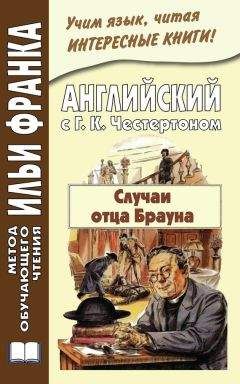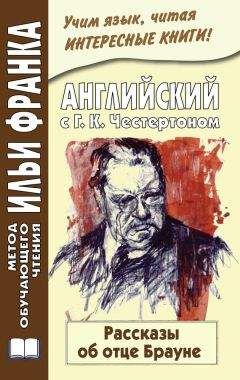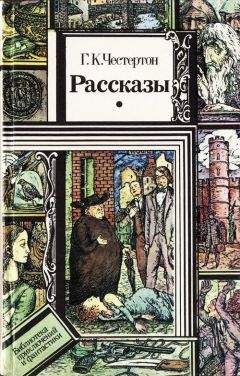Prince Saradine, with contracted brows, seemed to hesitate a moment, but his ears were still singing with the blow, and he sprang forward and snatched at one of the hilts. Father Brown had also sprung forward, striving to compose the dispute; but he soon found his personal presence made matters worse. Saradine was a French freemason and a fierce atheist, and a priest moved him by the law of contraries.
And for the other man (а для другого человека = а что же до незнакомца) neither priest nor layman moved him at all (то ни священники, ни миряне его совершенно не волновали; to move /зд./ – трогать, волновать). This young man with the Bonaparte face and the brown eyes (этот юноша с лицом Бонапарта и карими глазами) was something far sterner than a puritan – a pagan (был гораздо суровее любого пуританина – /он был/ язычником; something – до некоторой степени, несколько; far – вдали, далеко; гораздо, в значительной степени). He was a simple slayer from the morning of the earth (он был просто убийцей из первобытных времен; morning – утро; ранний период, начало; earth – земля; мир, свет); a man of the stone age – a man of stone (человек из каменного века – человек из камня).
One hope remained, the summoning of the household (оставалась одна надежда – позвать слуг; to summon – вызвать, позвать; household – домашнее хозяйство; домашние, домочадцы); and Father Brown ran back into the house (и отец Браун бегом бросился назад в дом; to run – бегать, бежать).
And for the other man neither priest nor layman moved him at all. This young man with the Bonaparte face and the brown eyes was something far sterner than a puritan – a pagan. He was a simple slayer from the morning of the earth; a man of the stone age – a man of stone.
One hope remained, the summoning of the household; and Father Brown ran back into the house.
He found, however (однако он обнаружил), that all the under servants had been given a holiday ashore by the autocrat Paul (что всем младшим слугам властный Пауль дал отпуск на берег; under – находящийся внизу или ниже чего-л.; младший /по чину, должности/; autocrat – автократ, самодержец), and that only the sombre Mrs. Anthony moved uneasily about the long rooms (и что только миссис Энтони беспокойно бродила по длинным комнатам; to move – двигать/ся/, перемещать/ся/). But the moment she turned a ghastly face upon him (но в то мгновение, когда она повернула к нему свое мертвенно-бледное лицо; ghastly – призрачный, похожий на привидение; мертвенно-бледный), he resolved one of the riddles of the house of mirrors (он разгадал одну из загадок зеркального дома; to resolve – решать /задачу, проблему и т. п./). The heavy brown eyes of Antonelli (печальные карие глаза Антонелли; heavy – тяжелый; печальный, грустный) were the heavy brown eyes of Mrs. Anthony (были печальными карими глазами миссис Энтони); and in a flash he saw half the story (и в один миг ему стала понятна половина /всей/ истории; flash – вспышка, сверкание; миг, мгновение; in a flash – в мгновение ока; to see – видеть, смотреть; понимать, знать).
He found, however, that all the under servants had been given a holiday ashore by the autocrat Paul, and that only the sombre Mrs. Anthony moved uneasily about the long rooms. But the moment she turned a ghastly face upon him, he resolved one of the riddles of the house of mirrors. The heavy brown eyes of Antonelli were the heavy brown eyes of Mrs. Anthony; and in a flash he saw half the story.
“Your son is outside,” he said without wasting words (снаружи стоит ваш сын, – сказал он, не тратя лишних слов); “either he or the prince will be killed (и либо он, либо принц /кто-то из них/ будет убит). Where is Mr. Paul (где мистер Пауль)?”
“He is at the landing-stage,” said the woman faintly (он на пристани, – еле /слышно/ произнесла женщина). “He is – he is – signalling for help (он… он… зовет на помощь; to signal – подавать сигнал).”
“Mrs. Anthony,” said Father Brown seriously (миссис Энтони, – сказал отец Браун строго: «серьезно»), “there is no time for nonsense (сейчас не время говорить вздор: «нет времени для чепухи»). My friend has his boat down the river fishing (мой друг на лодке /отправился/ рыбачить вниз по реке). Your son’s boat is guarded by your son’s men (лодку вашего сына охраняют его же люди). There is only this one canoe (остается только один челнок; canoe – каноэ; челнок, челн); what is Mr. Paul doing with it (что мистеру Паулю с ним делать)?”
“Your son is outside,” he said without wasting words; “either he or the prince will be killed. Where is Mr. Paul?”
“He is at the landing-stage,” said the woman faintly. “He is – he is – signalling for help.”
“Mrs. Anthony,” said Father Brown seriously, “there is no time for nonsense. My friend has his boat down the river fishing. Your son’s boat is guarded by your son’s men. There is only this one canoe; what is Mr. Paul doing with it?”
“Santa Maria! I do not know,” she said (Санта Мария! я не знаю, – сказала она); and swooned all her length on the matted floor (и упала в обморок, /растянувшись/ во весь рост: «во всю длину» на покрытом циновками полу; mat – циновка, коврик).
Father Brown lifted her to a sofa (отец Браун поднял ее на диван), flung a pot of water over her, shouted for help (плеснул на нее воды из кувшина, позвал на помощь; to fling – бросать, кидать; делать быстрое, стремительное движение; pot – горшок, котелок), and then rushed down to the landing-stage of the little island (и затем бросился к причалу). But the canoe was already in mid-stream (но челнок был уже на середине реки; mid– /прист./ – середина; stream – поток; небольшая речка, ручей), and old Paul was pulling and pushing it up the river (и старый Пауль, сидя на веслах, гнал его вверх по реке; to pull – тянуть, тащить; идти на веслах, грести; to push – толкать; подгонять) with an energy incredible at his years (с энергией, немыслимой для его лет).
“I will save my master (я спасу хозяина),” he cried, his eyes blazing maniacally (кричал он с бешено горящими глазами). “I will save him yet (я еще /успею/ спасти его)!”
“Santa Maria! I do not know,” she said; and swooned all her length on the matted floor.
Father Brown lifted her to a sofa, flung a pot of water over her, shouted for help, and then rushed down to the landing-stage of the little island. But the canoe was already in mid-stream, and old Paul was pulling and pushing it up the river with an energy incredible at his years.
“I will save my master,” he cried, his eyes blazing maniacally. “I will save him yet!”
Father Brown could do nothing but gaze after the boat (отцу Брауну ничего не оставалось, кроме как смотреть вслед челноку; to gaze – пристально смотреть, вглядываться) as it struggled up-stream (с трудом поднимающемуся вверх по течению; to struggle – бороться; пробиваться) and pray that the old man might waken the little town in time (и молиться, чтобы старик смог разбудить городок вовремя).
“A duel is bad enough (дуэль – это уже нехорошо; enough – довольно, достаточно),” he muttered, rubbing up his rough dust-coloured hair (пробормотал он, приглаживая свои жесткие волосы цвета пыли; to rub – тереть, протирать; up – вверх), “but there’s something wrong about this duel (но в этой дуэли что-то не так; wrong – неправильный, неверный; несоответствующий), even as a duel (даже если это дуэль). I feel it in my bones (я это всем сердцем чую: «я чувствую это в своих костях»). But what can it be (но что же это может быть)?”
Father Brown could do nothing but gaze after the boat as it struggled up-stream and pray that the old man might waken the little town in time.
“A duel is bad enough,” he muttered, rubbing up his rough dust-coloured hair, “but there’s something wrong about this duel, even as a duel. I feel it in my bones. But what can it be?”
As he stood staring at the water (пока он так стоял, глядя на воду; to stare – пристально глядеть, вглядываться), a wavering mirror of sunset (это колышущееся зеркало заката), he heard from the other end of the island garden a small but unmistakable sound (с другого конца островного сада послышался слабый, но очевидный звук; small – маленький; слабый /о звуке/; unmistakable – безошибочный, несомненный; mistake – ошибка; un– /прист./ – придает противоположное или отрицательное значение; – able /суф./ – образует прилагательные со значением обладания некоторым качеством) – the cold concussion of steel (холодный звон стали; concussion – удар, сотрясение). He turned his head (он повернул голову).
Away on the farthest cape or headland of the long islet (в самом отдаленном краю вытянутого в длину: «длинного» острова; away – далеко, вдали; cape – мыс; headland – мыс; коса), on a strip of turf beyond the last rank of roses (на полоске дерна за последним рядом розовых /кустов/), the duellists had already crossed swords (дуэлянты уже скрестили шпаги).
As he stood staring at the water, a wavering mirror of sunset, he heard from the other end of the island garden a small but unmistakable sound – the cold concussion of steel. He turned his head.
Away on the farthest cape or headland of the long islet, on a strip of turf beyond the last rank of roses, the duellists had already crossed swords.
Evening above them was a dome of virgin gold (вечернее /небо/ над ними образовывало купол из чистейшего золота; virgin – девственный, нетронутый; несмешанный, чистый), and, distant as they were (и, хоть они и находились /довольно/ далеко; distant – дальний, далекий), every detail was picked out (/можно было/ различить каждую деталь; to pick out – различать). They had cast off their coats (они сбросили свои сюртуки), but the yellow waistcoat and white hair of Saradine (но желтый жилет и белые волосы Сарадина), the red waistcoat and white trousers of Antonelli (/равно как/ красный жилет и белые панталоны Антонелли), glittered in the level light (сверкали в ровном свете /солнца/; level – плоский, ровный; одинаковый, равномерный) like the colours of the dancing clockwork dolls (как яркие одежды танцующих заводных кукол; colour – цвет, тон; colours – яркая одежда; clockwork – часовой механизм; заводной механизм). The two swords sparkled from point to pommel (две шпаги сверкали от острия до рукояти; pommel – головка /эфеса шпаги/) like two diamond pins (как две бриллиантовые булавки). There was something frightful in the two figures appearing so little and so gay (было что-то пугающее в этих двух фигурках, /издалека/ казавшихся такими маленькими и такими забавными; to appear – показываться, появляться; производить впечатление, казаться; gay – веселый; gaiety – веселость; веселье). They looked like two butterflies (они походили на двух бабочек; to look – смотреть, глядеть; выглядеть, казаться; to look like – быть похожим) trying to pin each other to a cork (пытающихся пришпилить друг друга к лубяной /дощечке/; pin – булавка; to pin – прикалывать, прикреплять; cork – пробка, кора пробкового дерева; луб).




